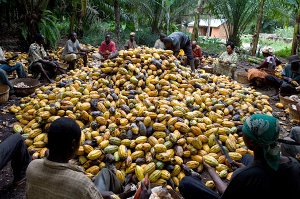Business News of Monday, 25 June 2012
Source: GNA
Ghana COCOBOD to supply 20 million cocoa seedlings to farmers

The Ghana COCOBOD is to supply 20 million hybrid cocoa seedlings free of charge to cocoa farmers this year; Reverend Abaka Ewusi, Executive Director, Cocoa Swollen Shoot Virus Disease (CSSVD) Control Unit (CU) Operations, has disclosed.
He said the seedlings would be given to farmers whose cocoa farms had been infected by the Cocoa Swollen Shoot Virus Disease (CSSVD) and those whose cocoa farms are more than 30 years, for re-planting.
Rev. Ewusi, who was speaking at the Eastern Regional Farmers rally on the CSSVD at Akyem Osenase in the West Akyem Municipality, said 3.5 million of the seedlings would be given to farmers in the region.
He advised farmers to register at the District Offices to enable them to be supplied with the seedlings when the programme takes off.
Rev. Ewusi said government was determined to sustain the cocoa industry and advised farmers who would benefit from the programme to plant the seedlings to enable the country to regain its position as world’s leading producer of cocoa.
The rally, which was jointly organized by Eastern Regional Secretariat of the CSSVD-CU and the Boadua Secretariat, aimed to educate farmers on the devastating nature of the disease and how to get rid of it.
The occasion was also used to educate the farmers on best farming practices to maximize production.
Rev. Ewusi suggested the involvement of the youth in agriculture, particularly cocoa production.
He said the Unit would organize quiz competition for Senior High School students in cocoa growing areas to encourage students to go into the cultivation of cocoa after completing school.
Mr. Francis Antwi Adjei, Regional Manager of the CSSVD-CU, told the farmers that the disease, which was first detected by a farmer at Nankese in the Suhum Kraboa Coaltar District, has no known cure.
He said the only cure for the disease which could spread from one cocoa farm to another, was to cut down the infected trees.
Mr. Adjei appealed to cocoa farmers to report to the nearest Secretariat when they detect the disease on their farms so that they could be assisted to cut the affected trees.
“After the trees had been cut down, you would be paid compensation and then supplied with hybrid cocoa seedlings free of charge for re-planting, which would start bearing fruits within two to three years”.
Mr. Samuel Amponsah, Deputy Regional Manager, CSSVD-CU, advised farmers to avoid engaging their children of school going age on cocoa farms at the expense of their education.
He said that buyers of Ghana’s cocoa on the world market would blacklist the country if they detect that children below 18 years are being engaged on worst forms of labour on cocoa farms.**










